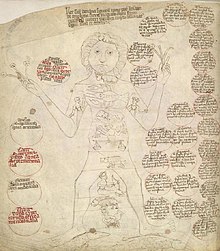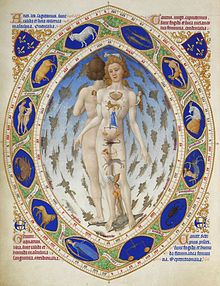
Back Iatromathematik German Astrología médica Spanish चिकित्सा ज्योतिष HI Melothesia Italian 의학 점성술 Korean Medicīniskā astroloģija Latvian/Lettish Medische astrologie Dutch Небесная магия Russian Медицинска астрологија Serbian Iatromatematik Swedish



Medical astrology or astrological medicine (traditionally known as iatromathematics) is an ancient applied branch of astrology based mostly on melothesia (Gr. μελοθεσία), the association of various parts of the body, diseases, and drugs with the nature of the sun, moon, planets, and the twelve astrological signs.[1] The underlying basis for medical astrology is considered to be a pseudoscience as there is no scientific basis for its core beliefs.[2][3][4][5][6][7]
Hippocratic Greek medical training included a doctrine of dies decretorii ("critical days").[8] Galen believed that heavenly bodies influenced human life but he had his misgivings about the predictions made by "horoscope-casters" (genethliakoi).[9] Astrology was however considered as a foundation for medical practice in ancient Greece and Arabia. In Italy astrological studies as part of a training for medicine was routine in Bologna. The training was not that strong in England but in medical practice astrological circumstances were claimed in cases to absolve surgeons of any blame. In England, Robert Fludd in his Medicina Catholica (Frankfort, 1629) noted that medicine, theology, and astrology formed a single unified discipline. Astrological medicine declined after the 17th century but there were calls for its renewal in 1928 by Rudyard Kipling who considered modern medicine too narrow.[10][11][12]
- ^ "Activities With Astrology". Astronomical society of the Pacific.
- ^ "Objections to Astrology: A Statement by 186 Leading Scientists". The Humanist, September/October 1975. Archived from the original on 2009-03-18.
- ^ Eysenck, H.J., Nias, D.K.B., Astrology: Science or Superstition? (Penguin Books, 1982)
- ^ Richard Dawkins (1995-12-31). "The Real Romance in the Stars". The Independent, December 1995. Archived from the original on 2022-05-12.
- ^ "British Physicist Debunks Astrology in Indian Lecture". Associated Press.
- ^ "Astronomical Pseudo-Science: A Skeptic's Resource List". Astronomical Society of the Pacific.
- ^ Paul R. Thagard, 'Why Astrology is a Pseudoscience', PSA, vol 1. University of Chicago Press, 1978.
- ^ Grove, Timothy Paul (2020-10-19), "Medical Astrology", Christ Came Forth from India, Brill Schöningh, pp. 314–332, ISBN 978-3-657-70516-0, retrieved 2024-04-08
- ^ Cooper, Glen M. (2011). "Galen and Astrology: A Mésalliance?". Early Science and Medicine. 16 (2): 120–146. doi:10.1163/157338211X557084. ISSN 1383-7427. JSTOR 23047154. PMID 21879603.
- ^ Dick, Hugh G. (1946). "Students of Physic and Astrology: A survey of astrological medicine in the age of science". Journal of the History of Medicine and Allied Sciences. 1 (2): 300–315. doi:10.1093/jhmas/1.2.300. ISSN 0022-5045. JSTOR 24619572. PMID 21027689.
- ^ Camden, Carroll (March 1930). "Elizabethan Astrological Medicine*This paper is a part of a longer study on Elizabethan astrology, especially its effect on literature". Annals of Medical History. 2 (2): 217–226. ISSN 0743-3131. PMC 7945748. PMID 33944310.
- ^ Caffrey, Brynna (2022-02-24). "Trusting the Stars: Using Astrology as Medicine". Canta Aeide: Journal of Classical Studies. 3 (1).